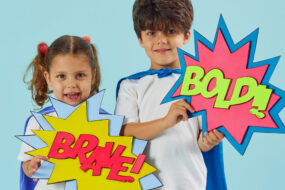Top tips to tame toddler tantrums
Parenting expert Pinky McKay shares what to do when your strong-willed toddler has an almighty meltdown.
Your once sweet, smiling baby has become a feisty toddler with a mind of their own, tantrums included.
Don’t despair, says baby care author Pinky McKay – tantrums are a normal fact of toddler life.
And there are ways to work around them.
Why do toddlers have tantrums?
“It can help to see tantrums as a storm of emotion a toddler isn’t equipped to handle,” Pinky tells The House of Wellness TV team.
Pinky says brain connections that produce big emotions develop long before the wiring that allows toddlers to control impulses and self-calm. Those abilities only kick in when a child is around three.
“When you first have a baby, you naturally attend to them and fill that tiny emotional tank throughout the day with cuddles, eye contact and loving interactions,” Pinky says.
“As your helpless baby becomes a toddler, it’s easy to get busy while they explore and amuse themselves.
“You aren’t quite as connected; then, as their ’emotional tank’ becomes empty, they can become overwhelmed with emotions that are too big.”
- Related story: How to raise safe, healthy and happy kids
How to deal with a toddler tantrum
Pinky says it’s easier to stay calm and guide little ones if we try to see things from the child’s perspective.
“Think, ‘My child is having a problem’ rather than, ‘My child is being a problem’,” she says.
“And ‘don’t sweat the small things’ is a good rule with two-year-olds.
“Save your energy for the things that really matter and avoid power struggles.
“Rules like seatbelts and holding hands near roads are not negotiable, but a balance between health and safety and a happy day can benefit family relationships and sanity!”
- More advice from Pinky McKay: Dads and baby bonding
Look for triggers
Looking out for common tantrum triggers is also important.
- Do they happen mostly when your tot is tired, hungry or rushed?
- Are there situations they find difficult to handle such as playgroup, shopping or being strapped in a car seat?
Keeping a tantrum diary might help you understand triggers, says Pinky.
“Try to think ahead and limit overwhelming situations. For instance, plan short shopping trips when they aren’t tired and take nutritious snacks and water to drink,” she says.
“Try not to push past your little one’s limits.”
- Related story: What it’s really like to have triplets
After the tantrum …
It’s important to realise that comforting your child after a tantrum isn’t giving in.
“Just as adults need comfort when they feel upset or overwhelmed, toddlers need to know they are loved, even when their behaviour isn’t loveable,” Pinky says.
“Your toddler won’t be in any space to reason with and will in any case not be able to activate the ‘reasoning’ part of their brain while they are distressed.
“As they calm, let them lie in your arms and cuddle them until they are through their blowout.”
Catch up on the full episode of The House of Wellness TV show to see more from Zoe, Ed and the team.






